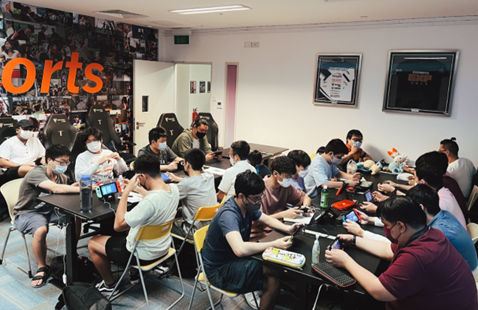The Gaming Intern is a series that follows *SCAPE’s Intern, Kay, as she goes around interviewing the leaders of various local esports communities. It aims to achieve a deeper understanding of esports topics, and allows us to see them through the eyes of the leaders themselves. In this article, we interviewed the leaders from the The Trainer Shed community.
The Trainer Shed is a Singapore-based Pokemon Video Game Championships (VGC) community that has been onboarded with *SCAPE. They have been holding a series of tournaments, called The Wonder Guard at *SCAPE to allow the Pokemon VGC local community to grow.
For youths who are interested in participating in their tournaments, do look out for their Wonder Guard tournament announcements via our *SCAPE esports Discord [Join here! https://discord.gg/gK6zaS8m3y]

(The Trainer Shed’s event in June, held in *SCAPE’s ESC Studio, photo courtesy of The Trainer Shed)
What has been your reaction to the fact that esports is now being included in the Olympics?
Brian: Gaming is very skill-based because you need a lot of technical skills that are similar to chess, like prediction, bot-positioning, and they need to be done under a time constraint, which I believe is an important element in sports.
Alan: I think it’s a great big step for the gaming community in general because we are getting more representation as a whole gaming base.
Brian: I am really happy that esports is gaining traction as it is. Knowing how much money the industry brings, I hope that this is a stepping stone for esports to be recognised as a mainstream sport.
How about the Pokemon VGC community?
Brian: We do not really consider ourselves an esport due to the lack of support from the Pokemon company. Everything we run is usually community-based, but I guess everything starts from a community, right? It can always escalate to the Olympics.
Alan: For our own community (Pokemon VGC), it is true that we aren’t getting enough support, and we do hope to get more from official partners in the future to allow us to up-scale our community. We would like for us to be able to make our tournaments more mainstream and allow more people to enjoy the game together.

(The Trainer Shed’s Wonder Guard tournament in July at *SCAPE’s ESC Studio, photo courtesy of The Trainer Shed)
With only a few gaming titles chosen to be part of the Olympics, do you think that a lack of inclusivity will be an issue?
Brian: I don’t think that it’s an issue. Such as in badminton, there are separate championships that are just as coveted as the Olympics. The Olympics are more about fighting for the pride of your own country. In esports, it is common to have teams that are made up of different nationalities, so it may not be fair in the Olympics-sense. The focus should not be about exclusivity, but on fighting for your own country’s pride.
Alan: At the end of the day, I think it boils down to how much a player enjoys a game, rather than about being included in one thing but not another.
Another controversial issue is the Olympics not allowing violence in gaming due to their Olympic values. Do you think this is a compromise the gaming community has to make in order to follow their international standards?
Brian: I think that the Olympics should be the ones changing their broadcasting terms. If their main source of income is broadcasting, they might want to cater to gamers and televise the esports Olympics on Twitch (popular gaming live streaming site) instead.
Alan: I agree. The Olympics should consider their target audience for broadcasts. If they are complaining about the violence in video games and only selecting those which are “less violent”, it might end up being less interesting. People will move to what they want to watch. Violent or not, at the end of the day, it is just a video game.
Brian: Admittedly, some games are too violent for the young to watch, which is why other platforms should be used to broadcast those games instead.
To wrap up, esports in the Olympics: yay or nay?
Brian: Yay.
Alan: Yay!

(The Trainer Shed leaders during the interview with *SCAPE Intern Kay)
Gaming Intern’s In-A-Nutshell:
A final word and insight from Intern Kay
It certainly was intriguing to find out what the Pokemon VGC thought about esports entering the Olympics. My biggest takeaway is certainly that the Olympics appears to need esports, more than esports needs the Olympics.
Indeed, they were proud that video games were finally entering such a mainstream competitive platform, but aside from that, the Olympics did not truly benefit the esports community in any large ways. Having the name of “Olympics” might be pretty big and comes with a level of global prestige, but there are many other esports tournaments that are on par in terms of prize pools or prestige in the gaming communities.
Controversial issues are not a major problem to the esports community because where the Olympics lacks in, they can always find a better fit for their video game somewhere else.
Additionally, as The Trainer Shed has mentioned, the Olympics’ concept of competing by country would pose an issue for the esports players, thus making the competition less appealing. It was an issue that I had failed to consider. When looking at the top esports teams, it is common to see a mixture of nationalities that come together to form a powerful team. Having to follow the Olympics’ structure of only teaming up with those in your own country might be seen as an impediment, and fails to entice these teams from participating.
To conclude this interview, the world of esports is not lacking in tournaments nor monetary prizes. The Olympics is simply another tournament to them. For people outside of the esports communities, it might seem as though entering the Olympics is one major step forward for gamers- and it is- but competition-wise, it is just one of many. Other tournaments for esports are already well established with large prize pools, containing less restrictions than that of the Olympics. As such, I would believe that esports does not truly need the Olympics, as much as the Olympics needs esports to attract this previously untapped gaming audience.

